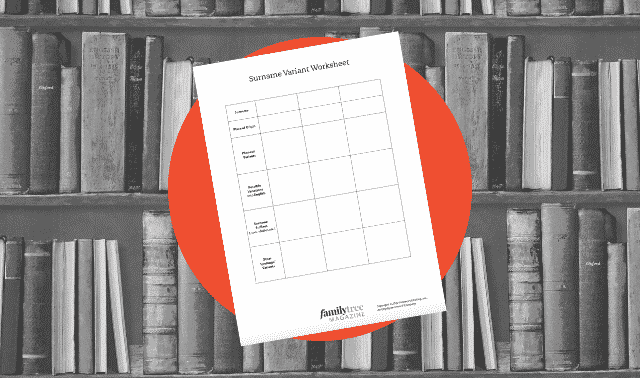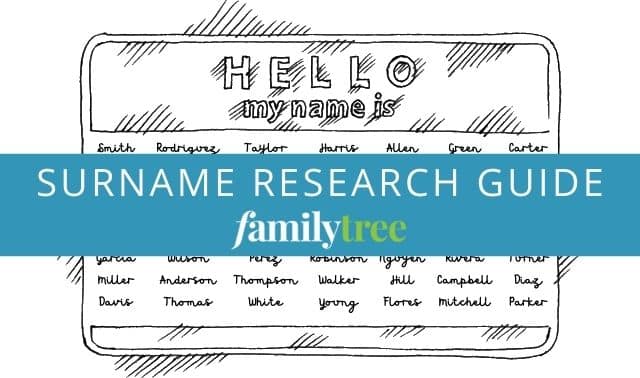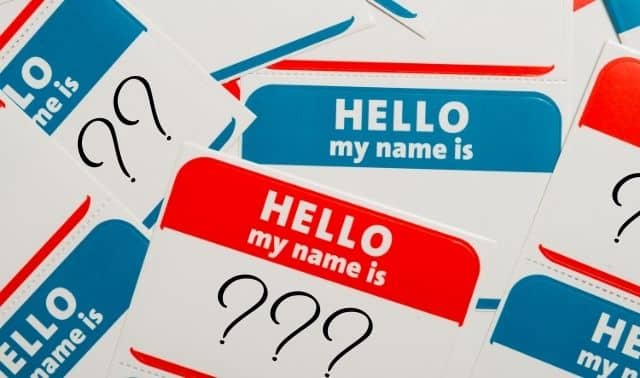Sign up for the Family Tree Newsletter! Plus, you’ll receive our 10 Essential Genealogy Research Forms PDF as a special thank you.
Get Your Free Genealogy Forms
"*" indicates required fields
In this article:
Extinct surnames
Using cluster genealogy
First names from surnames
Geography considerations
Spelling variations
Surname changes and original names
Surname projects
Related Reads
Having an unusual last name, like Fryxell, means a lifetime of enduring mispronunciations and spelling it out (“That’s F as in Frank, R, Y, X—yes, really, X … ”). But an oddball surname has its advantages, too. Those butchered pronunciations are a dead giveaway when telemarketers call (“May I speak with Mr., uh, FREE-zell?”). And an unusual last name—your own, or anywhere in your family tree—can be a valuable genealogy tool.
My own family name would’ve been the easy-to-spell Magnuson (or Magnusson in Sweden) if not for the Swedish army. When my great-great-uncle Sven Johan Magnusson did his army stint, there were simply too many Magnussons (and Anderssons and other –sons in Sweden’s patronymic naming system). To tell the soldiers apart, they got “army names” for the duration of their service. Sven Johan picked Fryxell after Anders Fryxell (1795–1881), a Swedish historian. When the ex-soldier and his brother, my great-grandfather Gustaf, came to America in 1876, they kept Sven’s army name and became John and Gustav Fryxell.
As far as I can tell, there are only two Fryxell families in the United States—mine and another that I presume is related to the original Anders Fryxell. (We usurpers got the last laugh, however: There’s a Lake Fryxell in Antarctica and even a Fryxell crater on the moon—both named for prominent geologists in my family.)
Obviously, that makes it pretty easy—a 50-50 chance—to identify Fryxell relatives. It also makes searching databases on FamilySearch.org or Ancestry.com a snap, with hardly any false hits. Even if your own surname is Smith or Jones, you can use the occasional oddball last names in your family tree to get around roadblocks in your research.
Here are a few strategies to help you uncover research clues.
Research Extinct Surnames
Some surnames that weren’t so uncommon in centuries past but have started to die out in recent years. According to MyHeritage’s blog, “endangered” last names with fewer than 20 contemporary “bearers” include:
- Sallow
- Fernsby
- Villin (Villan)
- Miracle
- Dankworth
- Relish
- MacQuoid
- Loughty
- Birdwhistle
- Berrycloth
- Tumbler
Yet having such an endangered surname in your pedigree doesn’t necessarily mean narrow results when you search records created when such names were more common. Searching the MyHeritage Family Trees database turns up nearly 200,000 results for Birdwhistle, more than 142,000 ancestors named Relish and a whopping 425,126 with the lovely name Miracle.
Surnames that are presumed to have gone “extinct” since 2011, according to the same source, include:
- Bread
- MacCaa
- Spinster
- Pussett/Puscat/Pussmaid
- Bythesea/Bytheseashore
Surprisingly, some of these were also once relatively common names. A search of the MyHeritage Family Trees database finds more than 93,000 hits for Bythesea and similar spellings, for example. So just because your surname is unusual today, don’t assume that’s always been the case. Search for those names on family history websites and in genealogical records, but remember to closely analyze any finds you make, rather than assuming a surname was uncommon back in your ancestor’s time and therefore that any person you find with that name is part of your family tree.
Use Cluster Genealogy
Unusual surnames, even those of only collateral relatives, are ideal fodder for a technique called cluster genealogy. Typically used with cousins, neighbors and associates who migrated with your ancestors (in a “cluster”), the strategy works even better when such folks have surnames that stand out.
Let’s say one of your Smith cousins back when married a Clement Flizbisket. You can’t figure out how your Smiths got to Arkansas, or where they lived before, and whenever you search, you get lost in the sea of Smiths. So try searching for Flizbiskets instead: It’s possible that the Flizbisket clan moved to Arkansas in a cluster with your Smiths, and that the Smiths you find in the census 20 years before in Tennessee, next door to the Flizbisket family, are “yours.”
Although not proof, the same notion can be used to disambiguate similarly named ancestors. If you find three Samuel Smiths in the same general part of the country, each with a daughter Sarah, the one who got a land grant adjoining Ezekiel Flizbisket—on the same day!—is likely your man, given that Sarah married Ezekiel’s son a few years later. You’ll still have to prove it’s the right Smith family, but now you have a research target to focus on.
Even when your family has no clear connection to folks with an oddball surname other than geographic proximity, you can use those neighbors to find your “missing” ancestors. Suppose you’ve been tracing your Eckstrom line backward through city directories—and then, one year, they’re AWOL. If the previous year they had neighbors named Diggleboots, try searching for that family instead. You’ll probably find your ancestors still next door, but with their names mis-transcribed as Extrom.
Unusual surnames can help solve passenger-list puzzles, too. Obviously, if your ancestor’s name was Libzewicz, you should start by searching for that unique surname. But if you’re cursed with a more common name like Berg, maybe your ancestor sailed with someone named Libzewicz. You might learn this from connections on this side of the Atlantic or even, jumping backwards to go forwards, from researching your ancestral village across the ocean.
Which of the countless passengers named Ira Berg is your great-grandfather? Likely the one on the same manifest as Ezra Libzewicz, who owned the grocery store around the corner in their new home in America.
Look at First or Middle Names for Clues
Another way unusual surnames can provide research clues is when they become unusual first or middle names. In the 18th and 19th centuries, it was common for family surnames, especially maiden names from the wife’s family or the husband’s mother’s family that would otherwise vanish, to be used as first or middle names for children.
The Oglesby surname in my mother’s family, for example, popped up in the given names of Oglesby Ashley Lowe (senior and junior) and Thomas Oglesby Rosser. Oglesby is a moderately unusual surname (more than 43,000 hits in MyHeritage’s Family Trees search), so the odds that these individuals bearing that name and living in the right place are related is pretty high.
You can work backward, too, and investigate whether an unusual first or middle name might be a clue to a missing maiden name. Such connections often skipped a generation: The grandmother of Oglesby Ashley Lowe, Sr., was Jerusha Oglesby. The same family has a Nisba Uptegrove Stowe (apparently they had a fondness for oddball first names, too), whose paternal grandmother was Amy Uptegrove.
So imagine you have an ancestor named Ferkwell Jones. Where could such a first name have come from? If you don’t know the maiden names for Ferkwell’s mother or grandmothers, you might want to see if any of he women were born of a Ferkwell family.
Consider Geography
Unusual surnames—or unusual spellings of surnames—may even provide geographic clues. Genealogy blogger Craig Manson, for example, has investigated the unusual surname Brayboy in his family tree, said to derive from “Braveboy.” He found that the surname is concentrated in just a few states—North and South Carolina, Florida, Georgia, Louisiana, Texas and Kentucky.
In North Carolina, the name is most associated with American Indians, primarily from the Lumbee tribe. In most other places, the Brayboy name appears predominantly among African-Americans, but in Kentucky people named Braboy (only one Y) are almost all white.
Similarly, the name Dameworth appears nearly isolated to eastern Tennessee and western Kentucky, according to message board posts by researcher Dean Dameworth.
The Boreanaz family, as in “Bones” TV star David Boreanaz, has its American roots almost entirely in Pennsylvania and New York, according to professional genealogist Megan Smolenyak. The lone Boreanaz family that ventured to Colorado fell victim to a flu pandemic, and the survivors returned to Pennsylvania. In Europe, Smolenyak found the Boreanaz surname traces to a long-ago immigration of Slovenes from the vicinity of Borjana into the border region of Italy.
Sometimes the surname itself isn’t as unusual as where it’s found. For example, German surnames such as Glazier, Ruttle and Switzer might not seem odd in a place like Pennsylvania, but they stick out in Ireland. These names are the heritage of about 3,000 refugees from the Palatine region of today’s Germany, who fled a French invasion in the early 1700s. Most settled in County Limerick and County Wexford with the assistance of English landlords who, like the refugees, were Protestants. Only about 500 people in Ireland today still trace Palatine origins, revealed in their surnames. A similar migration of French Huguenots left its imprint on Ireland in surnames like Blanc, Cobbe, Deverell and Trench.
Some references can help locate the geographic roots of your surnames, especially in Great Britain. These include Homes of Family Names in Great Britain by Henry Brougham Guppy (Kessinger Publishing), Dictionary of English and Welsh Surnames with Special American Instances by Charles Wareing Bardsley (Clearfield Co.), A Dictionary of British Surnames by P.H. Reaney and R.M. Wilson (Routledge) and A History of British Surnames by R.A. McKinley (Routledge). Many of these are available from the FamilySearch Library or at websites such as Internet Archive.
Check Spelling and Try Different Variations
Oddball surnames are a mixed blessing, however. You already know to check spelling variations of your ancestral names, but the more unusual the name the more likely it is to be misspelled or mistranscribed. Take it from me: Sometimes people just can’t believe it could possibly be spelled F-r-y-x-e-l-l. We’ve seen Fryzell, Frynell, Frytell, even Purcell.
Using wildcard characters such as * or ?—depending on the website—can help find your misspelled kin in online searches. You might have to get creative, thinking hard about what part of an unusual name is least likely to get screwed up. In the case of Fryxell, the Fry and ell pieces seem to survive mangling the best, so a search for Fry?ell can be effective.
When a surname has a lot of potentially mistaken letters at the end, such as Eastern European names that may or may not end in –cz, –wicz, –witz, etc., see if a database allows a wildcard representing zero to multiple letters. At Ancestry.com and FamilySearch, for example, while ? represents a single wildcard character, * stands for any number of unknown letters (or none). So Libze*, for instance, would find Libzewicz, Libzez, Libzewick and so on, as well as just plain Libze.
Be careful, too, with checking “exact” in searches involving unusual surnames. Because these names are so prone to errors, asking for only exact matches increases your risk of missing out on useful results.
Find When the Surname Changed
Keep in mind the possibility that a family’s unusual surname was changed at some point. You might have a case like mine, where searching for ancestors named Fryxell back in Sweden would have been fruitless—indeed, would have turned up an entirely wrong family.
Even a moderately unusual surname, like the Lundeens who married the Fryxells, could trip you up: I’d run into nothing but brick walls until my aunt casually mentioned, “Oh, didn’t you know they changed it? It used to be Ingelsson.” I still have no idea where Lundeen came from, but at least I found my Ingelsson ancestors.
Don’t assume the name changing is ever over, either. My great-grandfather Oscar Lundeen was “Ingelman” on his passenger record, Lundeen in America, Ingelsson again on his final naturalization papers and “Landin” on his headstone (I hope the family got a discount from the cemetery).
More common than choosing an unusual last name in America, of course, is “Americanizing” the surname on arrival here. Even though the “changed at Ellis Island” explanation is a myth, many people did simplify or Anglicize their names after arriving in their new country. So your Portuguese ancestors may have changed from Ribeiro to Roberts or even to Brooks. Your Polish Zapatoczny family might have become the slightly less unusual Zepp, or Barankierowczek became simply Brown. Passenger lists and naturalization records are good sources for immigrants’ original names.
The good news is that if and when you discover the original, less-common surname, your ancestors will stand out from the crowd and be easier to search for.
Surname Projects
Two ways to learn more about your unusual surname and connect it to genealogical finds are “one-name studies” and surname DNA projects.
One-name studies attempt to research all occurrences of a surname, sometimes restricted to one geographic area. According to the Guild of One-Name Studies, “a study may concentrate on aspects such as the geographical distribution of the name and the changes in that distribution over the centuries, or may attempt to reconstruct the genealogy of as many lines as possible bearing the name. A frequent aspiration is to identify a single original location of the name, especially if the name appears to derive from a place name.” Based in England but with members around the world, the guild currently has more than 8,800 registered one-name studies. Visit the website to see if there’s a study for your oddball surname or to launch one.
Because your Y-DNA (or your father’s or brother’s, if you’re a woman) generally has been passed down along with your surname over time, Y-DNA testing is ideal for identifying the genetic relationship—or lack thereof—among families bearing the same surname.
If you’ve taken a Y-DNA test, consider exploring a DNA surname project. A website and data may already exist for your surname—search for the name plus “surname DNA project”—or you can start your own. Family Tree DNA, the only genetic genealogy testing company that offers Y-DNA testing, lists surname projects.
Whatever you learn about your unusual surname, take pride in knowing that your family name is special. The fact that there were fewer than 200 Fryxells (mine and that other family) in the 2000 US census almost makes up for a lifetime of having my name butchered by everyone from gym teachers to receptionists. Please, though, make sure it’s spelled right on my headstone.
Related Reads
A version of this article appeared in the January/February 2016 issue of Family Tree Magazine. Last updated: June 2025
Note: FamilyTreeMagazine.com is a participant in the Amazon Associates Program, an affiliate advertising program. It provides a means for this site to earn advertising fees, by advertising and linking to Amazon and affiliated websites.









